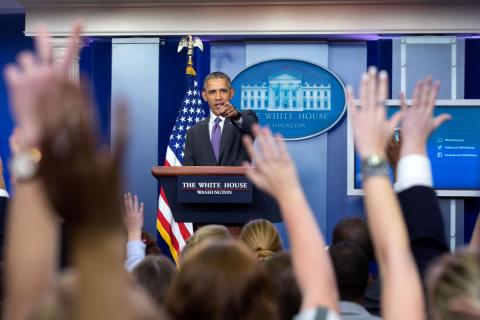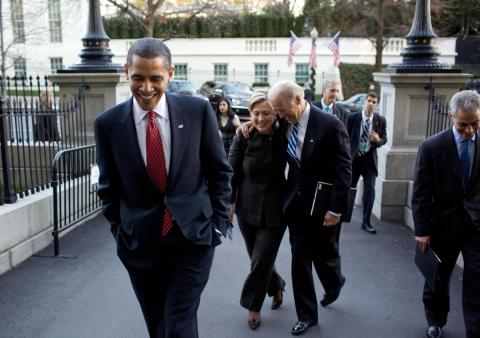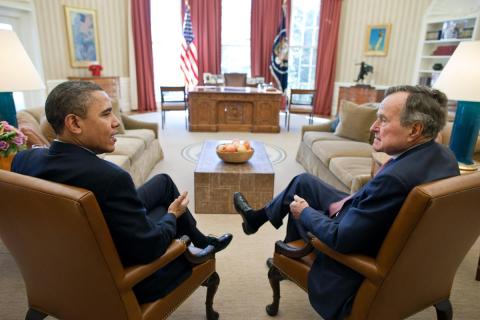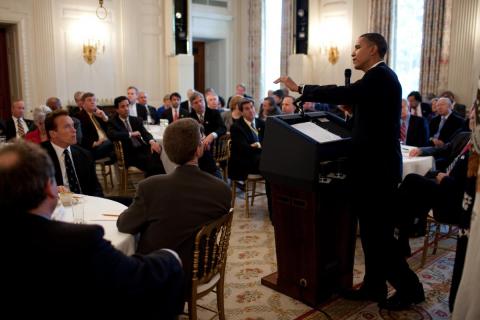On This Page
- Rendering Links ...
Research Frequently Asked Questions

Are the Barack Obama Presidential records available for research?
Yes. Obama Presidential records became subject to Freedom of Information Act (FOIA) requests on January 20, 2022. Guidance and tips on submitting FOIA requests can be found here.
How can I access Obama Presidential records?
Barack Obama Presidential records are stored and preserved by the National Archives. However, they are not accessible to the public. Records, both digitized and born-digital, will be made available for research online via the Obama Library website and the National Archives Catalog (NAC). NARA is digitizing textual (paper) records as quickly as possible. Textual records will be scanned in their original order and organized by folder, so researchers can still read the documents in their correct context.
How can I request records not yet available for public research?
Anyone may request access to Presidential records not yet available for public research by submitting a written Freedom of Information Act (FOIA) request. Guidance and tips on submitting FOIA requests can be found here.
What types of records are available for research?
Textual Records
The Barack Obama Presidential Library holds more than 30 million pages of textual (paper) Presidential records from the Executive Office of the President (EOP). View the Finding Aids page for more information on records released via Freedom of Information Act (FOIA) requests.
Audiovisual Records
The Barack Obama Presidential Library holds over 600 cubic feet of audiovisual recordings and the 3 million digital photographs created by the White House Photo Office. The audiovisual holdings predominantly include materials from President Obama's time in the White House, many of which are already available in the public domain. View the Audiovisual Records page for more information.
Please contact the Office of Barack and Michelle Obama for information on pre-and post-presidential audiovisual records.
Electronic Records
NARA's Electronic Records Archive (ERA) system stores and processes electronic records from the Barack Obama Administration. The Executive Office of the President (EOP-ERA) version of the system exclusively stores unclassified Presidential records, such as emails and shared drive files.
Over 250 TB of records were ingested into EOP-ERA at the close of the Obama Administration, including:
- Over 300 million e-mail messages
- Over 3 million digital photographs
- Over 30 million other electronic records
These electronic records are preserved within EOP-ERA in groups called Search and Access Sets (SAS). Records are included in a SAS based on the system that originally created the records. SAS includes data created by electronic data systems used for email management, photograph organization, visitor records, scheduling, and other functions.
EOP-ERA also contains files from hard drives on White House computers, including home drives maintained by individual staffers and shared drives used across White House offices. Hard drives are organized by the White House component, and thereunder by individual offices or staff members:
- CEA (Council of Economic Advisers)
- EXR (Executive Residence)
- NSC (National Security Council)
- OA (Office of Administration)
- PIAB (President’s Intelligence Advisory Board)
- WHO (White House Office): This drive contains the majority of the offices that have not already been named, including (but not limited to) Chief of Staff, Domestic Policy Council, Office of the First Lady, Speechwriting, Press Office, etc.
View the Finding Aids page for more information on records released via Freedom of Information Act (FOIA) requests.
What are classified and closed records?
The National Archives and Records Administration aims to provide as much access to records as possible. However, certain records must be withheld for restrictions and/or exemptions outlined in the Presidential Records Act (PRA), as amended, and the Freedom of Information Act (FOIA). The information not released includes national security, confidential advice, and personal privacy information. Researchers are alerted to the exemption of records or portions of records. Withdrawal markers on documents provide the reason(s) why the information has been withheld or redacted.
Can I appeal the closure of records restricted under the PRA and FOIA?
Yes. Original requesters may file an appeal challenging the status of records closed under the PRA and/or FOIA provisions.
Can I request declassification of national security information?
Yes. All national security records responsive to a FOIA request will be reviewed. Any records restricted under the national security provisions of the PRA and FOIA are eligible for a declassification review.
Researchers may also file a Mandatory Declassification Review (MDR) request for specific national security classified records. Guidance and tips on submitting MDR requests can be found here.
How does copyright law affect my research?
The United States Copyright Law (P.L. 94-553) provides statutory protection for the authors or producers of original works. The copyright law gives the author and his or her heirs the sole right of publication for the term of the copyright. The use of copyrighted material requires the permission of the holder of the copyright. Permission to reproduce copyrighted materials contained in the holdings of the Obama Presidential Library must be obtained from the copyright holder. The copyright law does not apply to material in the public domain or material produced by government employees in the course of their official duties. Researchers with specific questions about copyright law should obtain legal advice. Federal employees are not authorized to provide guidance with regard to copyright laws.
How do I cite my sources?
Citing or documenting sources used in research serves many purposes. Correctly citing sources gives credit to the authors of the words, ideas, photographs, videos, or artifacts incorporated into your work. Citing sources also provides authority to information shared and allows information to be discovered by others. Guidelines for citations for records retrieved from the Barack Obama Presidential Library can be found here.
Visit this site for additional information on citing sources from the National Archives and Records Administration (NARA).
What materials are not held at the Obama Presidential Library?
Campaign and Transition Materials
As per the Presidential Records Act (PRA), campaign and transition records are considered "personal records," rather than "presidential records." Campaign and transition materials are NOT included in our collection. For more information on the PRA, including an in-depth description of what is and is not considered records, view the PRA guide here.
Vice President Joe Biden's official records
Vice President Biden's records are NOT housed at the Barack Obama Presidential Library. These records are at the National Archives and Records Administrations in Washington, DC. For information on these records of Vice President Biden please contact the Archival Operations Division:
Archival Operations Division- Vice Presidential Materials
National Archives and Records Administration
700 Pennsylvania Avenue, Room G-7
Washington, DC 20408
vp.records@nara.gov

Are there additional research resources you recommend?
We recommend non-partisan resources for those who want to learn more about President Obama, the National Archives and Records Administration holdings, and learners or researchers looking for general government research information.
The Obama Administration
- Archived White House Websites and Social Media
The White House websites and certain social media accounts were "frozen in time," on the last day of President Obama’s term in office. - Public Papers of the President: Barack Obama
The Government Publishing Office (GPO) maintains a digital version of Public Papers of the Presidents of the United States, which includes published documents and speeches. - Executive Orders of President Barack Obama
List of all Executive Orders signed by President Obama, as compiled in the Federal Register.
National Archives and Records Administration (NARA)
- Archives.gov
NARA’s main website includes an overview of policies and lists of records available for research, lesson plans and other resources for educators, and information about the NARA facilities across the country. - National Archives Catalog
NARA’s online catalog enables researchers to search for descriptions of NARA’s records and provides online access to collections that have been digitized. - The Center for Legislative Archives
The Center for Legislative Archives is the branch of NARA responsible for preserving and processing the records of the US Congress. - Presidential Records on Archives.gov
A section of NARA's main website that highlights Presidential Records. Additionally users can explore Presidents' Daily Diaries and Schedules.
General Government Research
- The American Presidency Project
A project of the University of California - Santa Barbara, the American Presidency Project provides a searchable interface for Presidential materials from George Washington to Donald J. Trump. - The Miller Center of Public Affairs
The Miller Center of Public Affairs, part of the University of Virginia, maintains an online collection of biographies, essays, exhibits, oral histories, speeches, photographs, and oral histories about the U.S. Presidential administrations. - Gov Info, Government Printing Office
Online access to official Federal resources from all three branches of the Federal Government published by the U.S. Government Printing Office. - Congress.gov
Formerly known as THOMAS, the website for Congress includes a search engine for legislative information including bills and resolutions, calendars, and the Congressional Record. - White House Historical Association
The White House Historical Association provides insight into the cultural significance of the White House itself, with online exhibits on traditions, furnishings, and holidays, plus biographies of the First Families. - CIA FOIA Electronic Reading Room
The Central Intelligence Agency’s electronic, searchable library of documents has been released through FOIA requests. - Department of State, Office of the Historian
The Office of the Historian of the State Department provides a chronological list of Presidential and Secretary of State travel, visits from foreign leaders, and more. - Foreign Relations of the U.S. (FRUS)
Compiled by the Department of State, the “FRUS,” series is the official historical record of U.S. foreign policy and diplomatic activity.

How can I research the records of other U.S. Presidents?
- Presidential Libraries
Visit the Presidential Libraries online or discover how you can visit a Presidential Library in-person. - General
Research resources compiled by the National Archives. - Inaugurations
The 20th amendment to the Constitution specifies that the term of each elected President of the United States begins at noon on January 20 of the year following the election. Each President must take the oath of office before assuming the duties of the position. These sources can be used to gain a greater understanding of U.S Presidential Inaugurations. - The 25th Amendment
Learn more about the Presidential Order of Succession. - Presidential Collections
Online resources for researching individual Presidents. - First Ladies
Online resources to learn more on the contributions of the First Ladies. - Portraits and Photographs of Presidents and First Ladies
Gain digital access to portraits, paintings, sculptures, photographs, and other likenesses of the Presidents and First Ladies. - Salaries and Retirement Benefits of U.S. Presidents
These resources describe the pension and benefits granted to former Presidents and policy implications, along with up-to-date salary and benefit information for the President, the Vice President, and high-ranking government officials. - Presidential Documents
Here you will find various government documents, including Compilation of Presidential Documents, Economic Report of the President, Public Papers of the Presidents of the United States, along with website links to Executive Orders, Proclamations, and other Presidential documents. - Founders Online
If you are interested in the ideas behind the founding of our democracy, you can use Founders Online to go straight to the source. Founders Online collects in one place the papers, written by or addressed to, seven key figures of the era: John Adams, along with son John Quincy Adams, Benjamin Franklin, Alexander Hamilton, John Jay, James Madison, Thomas Jefferson, and George Washington. You can access annotated first drafts of the Declaration of Independence, the spirited debate over the Constitution and Bill of Rights, and the records of the very beginnings of our national story. Also available is firsthand details of the Founders’ personal lives as told in their own voices.
On This Page

